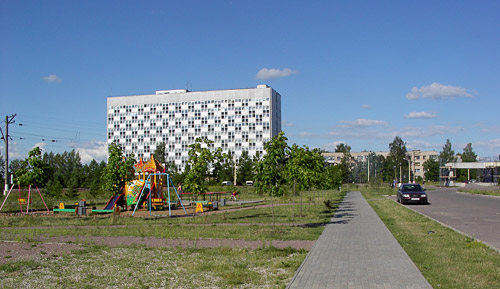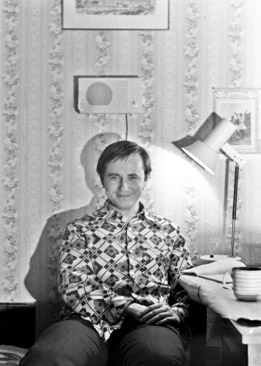
Electronic english version since 2022 |
The newspaper was founded in November 1957
| |
Contemporary memoirs
Fun times at Hilton

A hostel for young specialists was once called Hilton. To this day it stands on the left side of the road if to go from the Bolshaya Volga part to the Institute part of the city, bypassing the Chernaya Rechka part. The building resembles a chessboard and has a cheerful look. Today it is better known as Grill - this is the name of the cafe on the ground floor. Young specialists have quietly passed the age of young specialists, some even have got families and cars, have raised their children, while still living in a hostel for young specialists.
Hilton at first impressed with the comfort of his chambers. It was a hotel-style hostel, a rarity in the 1970s. But even incorrigible romantics dreamed of a separate apartment. For, as Kant said, one cannot live in a hostel and be free from the rules of living in it. One of these rules was: "Guests only until 11.00 PM." And of course, it was violated quite often - sometimes with a scandal, but more often without.
We lived on the tenth floor, overlooking the "sea" - the Ivankovskoye reservoir; it was especially good in the summer hours before sunset. I still remember normal atmospheric pressure in hectopascals, because it is numerically equal to the number of the room where we lived.
Our radio
We had a wonderful loudspeaker-type radio in our room. From time to time it spontaneously turned off and then turned on of its own accord, completely unpredictably. My first roommate, Yura Andriyanov, once said bitterly:
"And who is to blame?"
He meant the situation in the country. We then thought in broad categories: the country, the world, the person and the Universe. I sympathetically remained silent. The radio suddenly turned on and said:
"... Pushkin."
Such a story does not cost anything to invent, but it is the pure truth. I mentioned our radio because it is here - the same Chekhov gun that is sure to fire in the last act.
Slavik gives up smoking
Shortly after Yura Andriyanov unexpectedly had got married and had moved out to the family hostel opposite Ogonyok, I had a new neighbor - Slavik Gonchakov. Slavik had (and still has) many outstanding abilities and a deformity: he abused smoking, he knew this deformity in himself and gave up smoking from time to time.
We are going to work, Slavik says:
"I'm going to give up smoking. I'll gradually lower the rate, to a cigarette every day. Yesterday I smoke two cigarettes. I'm going to smoke only one today. Now I'll come - and I'll smoke it right away. I really want to smoke!"
Twenty years later I saw him at a tobacco shop. Vyacheslav Sergeevich was buying two packs of cigarettes at once.
"Supply is needed," he explained confidentially...
The colleague Khutornoy
Slavik attracted people with his powerful intellect, as well as a plenty of home cooking that he brought from his family estate in Pereslavl-Zalessky, on the Lake Pleshcheyevo. Among the home-made preparations there were pies with all kinds of fillings, mushrooms and cucumbers in pickles and marinades and other homemade food that is so highly valued in the hostel. Over time, a narrow circle of regulars in our room formed.
This circle included Kolya Khutornoy, a deep thinker and a great original, largely unappreciated by his fellow contemporaries. Subsequently, he published a book of poems and not bad ones, but no one suspected that he wrote poetry and in appearance he did not resemble a poet in any way. Petya Sychev, the author of the April Fool's quasi-scientific treatise on queues, when formulating the postulate about a finite number of friends and acquaintances being able to queue, was forced to make a reservation: "With regard to N. Khutornoy, this statement is nothing more than a hypothesis."
So that the image of Nikolay Khutornoy does not come out one-sided or skinny, I will give one more episode. Amin, another regular in our room, told how he had met Kolya.
They gathered to have dinner at Lena Koptar's. A lampshade with the same capricious character as our radio was hanging above the table. From time to time it unexpectedly came down. Inviting to dinner, Lena warned:
"Kolya, just don't make sudden movements, please."
"Good, good," Kolya frowned in annoyance, brushing it off, touched the lampshade, it collapsed down and ..."
And there was no dinner.
On the days of defeat...
We often spent our leisure time playing chess. After losing another blitz, Kolya complained, "You, Slavik, have bad buttons. If you had good buttons, I would play better."
"What do the buttons have to do with it, Kolya?" Slavik meekly objected, setting the chess clock again. "We don't play buttons..."
...and victories
Amin was watching Slavik to beat Kolya and he also wanted to play:
"Come on, Slavik, let me beat him too!"
And he unexpectedly lost.
"Wow!" he was surprised.
Kolya laughed victoriously, looked around the room vigilantly and asked in a businesslike manner:
"Slavik, do you have anything to eat?"
"I have bread, Kolya. Black bread."
"Come on," Kolya agreed generously.
"And still horseradish. Grated horseradish."
"Black bread with horseradish!" Kolya said. "Real Russian food!"
While he was walking around the table, throwing his right arm up, Slavik took out bread from the refrigerator (where it was hidden from cockroaches), a jar of horseradish and after hesitating cut the bread into slices.
"Spread it on bread for Kolya, Slavik," Amin advised.
"I'll spread it on bread myself," Kolya objected authoritatively.
But Slavik remembered too well how Kolya had plopped down on the sofa where there had been a pot of rosehip infusion wrapped in a blanket: Kolya had scalded his legs with hot rosehip and Slavik had dried the mattress for half the night and had gone to sleep at Amin's in the morning.
"No, I'd better spread it for you," Slavik said firmly.
"Okay," Kolya agreed arrogantly...
Mushrooms and beer
Shura Makankin, an engineer, also came in (the others worked as programmers). Shura was younger than the rest, but still with life experience and this often makes a person a cynic. Nothing like this happened to Shura: he almost always took people at their word. Once we talked about mushrooms.
"Let's ask Slavik," Amin suggested. "Slavik, what is the biggest mushroom you have found in your life?"
"It doesn't matter big or not big, but such a one that its hat completely covers the basket - it was like that," Slavik willingly responded.
"Wow!" Makankin admired, not knowing what to be more surprised at: this find of Slavik or what a bullshit artist he was.
Another time they argued about who had drunk for the first time in his life before the others.
"I drank in the seventh grade," Amin admitted.
"Wow!"
"What's wrong with that? Our fellows started earlier. Let's ask Slavik. Slavik, when did you drink for the first time in your life?"
"When I was two years old," Slavik answered willingly.
"What?!!"
"It happened this way. We went to the bathhouse with dad. Dad drank a mug of beer - and I drank a mug of beer under the table. Dad drank the second one, but I could no longer..."
Bach
They played cards. A concert of classical music was broadcast on the radio.
"Ahhh..." Zhenya Mazepa was singing along with the People's Artists of the USSR. "My God, give me the right card... Mister Kanchakoff! If you say that you will eat bread with butter! Otherwise ...Anschluss… Shoot!"
"Slavik, knock him out!" Kolya could no longer stand it. The radio suddenly went silent. Kolya laughed...
Slavik offered to have a snack. He made tea, got homemade cheesecakes. Everyone got a plate and then our radio suddenly turned on and said:
"Bach."
Everyone looked at Kolya. The radio clarified:
"A joke."
"Thank you for warning," Slavik laughed...
Solace with wit
I must say that Mazepa did not live in a hostel at Moskovskaya, 2. As a family man, he was immediately provided a room in a communal apartment as soon as he came to JINR. He also boasted: "From under Zaginayko." And for a separate apartment he had to wait for years and years. And when we thought about the plot for the New Year's performance, Zhenya said:
"What is there to think about? It is necessary to hold a meeting of the housing commission based on "The Adventures of Cipollino" by Gianni Rodari, how Uncle Pumpkin hid his house!
* * *
We moved out of Moskovskaya, 2 a long time ago and we see each other rarer and rarer in the city. Amin returned to the Caucasus, he teaches at the Circassian University. Makankin has worked in Germany for many years and has now returned. Kolya has visited Canada and has worked there for several years. And that's how he got there. He announced that he was tired of begging and went to the Canadian embassy. There he said: I want to go to Canada, I'm even ready to accept citizenship. Without any JINR and other hemorrhoids. The people at the embassy were sympathetic. A place in Canada was found for Kolya and he didn't even have to change citizenship...
... And how many more stories are kept by the walls of Mokhovaya, 6, Mira, 8 and other hostels of the city! What a pity that the great Russian literature did not spend the night here!
Aleksandr RASTORGUEV
 Hello, Sasha!
Hello, Sasha!
I received your letter and read the attached text. I answer based on my fresh impressions:
1. I do not mind the positions where you mention me. True, I did not bring flour and I did not either learn how to bake. I dried crackers in a frying pan that were eaten very quickly; there was a lot of tea that we bought for our common fund with you from the delivery of empty bottles. It was large: enough for tea, although we had to buy a large pack of Indian tea (at 76 kopecks per pack) every week, or even two. The fund was so good that in the end we divided it in half and if you remember, each got 20 rubles. Potatoes were also regularly fried on the stove.
2. About criticism: if you look at the text through the eyes of an outer, uninformed reader, it is difficult to understand where the names of the characters come from. You should think about it. Of course, everything is clear for both of us.
I wish you success in literature!
With regards,
Slava Gonchakov